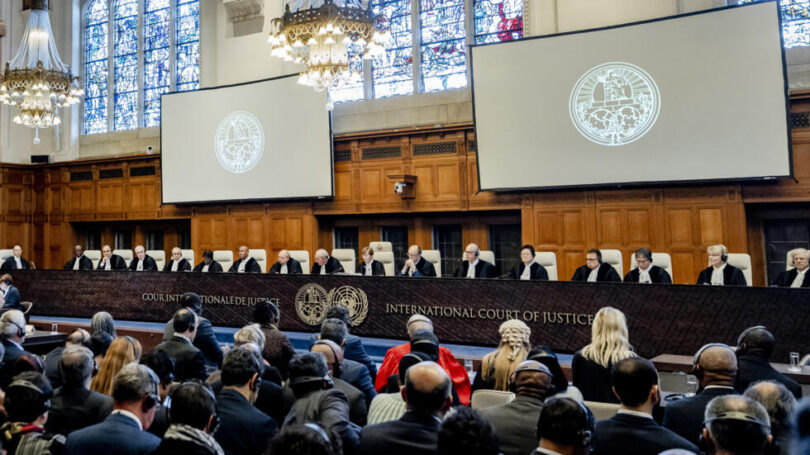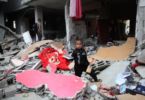Amid the apartheid Israeli regime preparing to launch a military offensive in Rafah and scale up its restrictions against Palestinians barring them from accessing the most sacred Islamic religious site, Al-Aqsa mosque during the upcoming Ramadan. The United Nations’s top court is set to open historic hearings into the legality of Israel’s 57-year occupation of the Palestinian territories. The week-long proceedings began at the International Court of Justice (ICJ) on Monday. The court will focus on Israel’s occupation of the West Bank, Gaza, and East Jerusalem since 1967. According to the reports, Palestinian representatives will speak first and will argue that the Israeli occupation is illegal because it has violated three key tenets of international law, wherein, the Jewish state has violated the prohibition on territorial conquest by annexing large swathes of occupied land, violated Palestinians’ rights to self-determination and imposed a system of racial discrimination and apartheid. Israel refused to appear before the court however it has submitted a written statement in its defence.
Historically, the United Nations has consistently maintained that Israel’s occupation of the West Bank is illegal under International law. The UN appointed a Commission of Inquiry that specifically highlighted the permanence of this occupation and the de facto annexation policies pursued by Tel Aviv over the past decades. Those policies involve seizing, annexing, fragmenting, and transferring illegally occupied Palestinian land to Jewish settlers with the ultimate aim of demographic change in the globally recognized disputed territory. The Israeli government has built 146 illegal settlements in the occupied West Bank, which are home to more than 500,000 Jewish settlers. The West Bank settler population has grown by more than 15 percent in the last five years, which endangers the cultural existence of the Palestinian people by erasing or appropriating symbols of Palestinians’ identity in the forcefully occupied region.
Israel withdrew its military from the Gaza Strip in 2005 but retained its controls on access, borders, and air space leading to a global debate about the nature of Israeli occupation/ presence or a kind of blockade of Palestinian territory under the global law and UN charter. Similarly, the Jewish Army captured the historic city of East Jerusalem from Arabs and later declared its future capital further irking the Palestinian Muslims and complicating the Palestine issue. Presently, over 200,000 Israeli settlers live in East Jerusalem, which Israel considers to be neighborhoods of its capital.
Historically, Israel has implemented the Settlement Enterprise attitude by maintaining and consolidating its permanent control over occupied territories which is a clear violation of international law. The Jewish state enforced restrictive urban planning, and zoning policies and contained Palestinian land through the construction of walls, barricades, land, sea, and air blockades turning the occupied territory into an open prison. The Israeli authorities also illegally made expropriation, and exploitation of land and natural resources of the Palestinian state. The case arrived at the world’s top judicial forum after the UN General Assembly (UNGA) voted by a wide margin in December 2022 to ask the 15-judge panel for a non-binding advisory opinion on the Israeli occupation.
Years-long delay and ruckus at the UN indirectly supported Israel’s illegal occupation and unlawful actions in occupied Palestinian land. The UN Security Council failed to adopt an impartial resolution due to excessive use of discriminatory veto power by the United States which protects Israel’s core interests at all forums. In the presence of a high level of discrimination and bias at the UN Security Council, the UN General Assembly and the ICJ like nonbinding forums had been left to deliver justice on important global issues relating to the weak nations. At the Hague court, the core Muslim world including victim Palestinians, the OIC, the Arab League, and the African Union will present their arguments in support of the Palestine cause. The result is unsure, however any effective verdict in favor of Palestinians is less likely to come that reduce their suffering and resolve their agonies. Previously, the ICJ announced an impaired decison over South Africa’s petition regarding the ongoing Palestinian genocide at the hands of Israeli troops, now The World Court faces another test of its adjudicators regarding their professionalism, consciousness, and impartiality. The Muslim world and the global community wait anxiously for how Hague judges define Israel’s apartheid policies and what kind of egalitarianism they would serve regarding the fundamental rights of Palestinian people in their occupied homeland.







